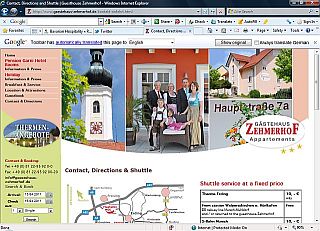Throughout our partnership project we held our meetings and stayed in a number of rural tourism accommodations. Each were examples of good practice in their own countries. I came accross this example of a rural tourism accommodation from Bulgaria that our colleagues from BARET prepared for us during one of our meetings. I decided that it was worth sharing with you as an example of a typical small tourism enterprise from rural Bulgaria.
Location
Guest House “Villa Alamurovi” is located in the village of Bov within the Western Balkan Range, some 51 km north of downtown Sofia – the biggest source of tourism demand and 10 km from the small town (and municipal center) of Svoge, on the shore of the Iskar River in the picturesque Iskar River Gorge.
The rich vegetation and biodiversity, nature reserves and parks and protected landmarks in the vicinity of the village, made the Iskar River Gorge a major attraction for all nature, sports and tourism followers. The proximity of the guest house by the river provides opportunities for practicing river fishing, but there are also many walking routes of varying difficulty. Villa Alamurovi is located just 1.5 km. away from the newly developed Vazov green trail. It is located close to other tourist attractions including; the Seven Altars Monastery, Cherepish Monastery, Chemernik ecofarm, Skaklia waterfall and the Izdremetskite lakes to name a few.
Ownership and Registration
The guest house represents a typical case of family-run hotel because the staff consists of family members only, who posses the land. The area of about 4 ha is owned by Mr. Petko Alamurov since 1952, as it subsequently was inherited by his son Mr. Kiril Alamurov. With joint efforts family members built three-storey house which originally was not intended to be turned into a guest house. It was more recently when Mr. Georgi Alamurov Manager, came up with the idea of operating the facility as a small family guesthouse. Thanks to many satisfied customers service and atmosphere, today Villa Alamurovi attracts more and more visitors from different parts of the country and even from abroad. In this context, the object is registered in the municipality of Svoge in 2009 as a “guest house” and is currently still in the process of categorization and certification. This category of accommodation facilities is two stars according to categorization regulations in Bulgaria.
Description
Villa Alamurovi is a guest house consisting of a three-storey building located in a yard area of 4 ha. The villa has 12 +1 beds, household furnished restaurant, barbecue, furnace and well equipped kitchen. The interior of the house and the yard arrangement are distinguished for its unique mixture of Bulgarian and Hungarian tradition. This symbiosis of cultural layers makes the overall look of the place even more exotic and interesting.
Currently available accommodation facilities satisfy the demand and the expectations of the visitors, but the in the future, additional lodging facilities and a swimming pool are planned.
Marketing
Currently the guesthouse relies on its website of the guesthouse and on satisfied repeat guests who return again and share experiences with family/friends. The return visitors are the best living advertisement for the quality of services and accommodation available.
Potential target groups for the guest house are: people looking for a short-term holiday, mostly residents of the capital Sofia, connoisseurs of brandy and wine tourists along with fishermen, cavers, people interested in trekking, or people who simply enjoy nature, and of course, admirers of good cuisine (Bulgarian and Hungarian).
Types of Tourism
The region favors the development of different types of tourism activities, primarily brandy and wine-tasting, rural, religious, speleological and off-road driving. Villa Alamurovi Guest House has a tradition in the production of white wine and various types of rakia, produced in accordance with Hungarian and Bulgarian traditional recipes. Production is now bottled and consumed by family members and friends of the manufacturer. Alcoholic drinks are not for sale to visitors because of a lack of license.
Tourists can practice a variety of activities such as fishing, hiking, and off-road driving with jeeps provided by the guest house manager. Visitors can buy fresh dairy products from the nearby ecofarm (blue cheese, cottage cheese, milk and yogurt) where visitors can see also the beautiful red deer. These dairy products can also be purchased at the guesthouse, not only at the ecofarm itself. Also located nearby is another farm which main activity is raspberry growing . All this, along with the unique “rakia” and “wine” tasting tourism make the site extremely attractive and highly competitive.
Competitive advantages
• Unique blend of Hungarian and Bulgarian folk style that gives a particular atmosphere and mood. This feature is not detectable only in visual contact with the place, but when tasting the authentic Hungarian goulash and fuller taste of brandy and white wine;
• Weak competition in the area – there are no similar facilities for accommodation;
• Proximity to the capital – which is the main source of tourism demand
• Close to the village of Iskrets – the place with the least number of foggy days in the country and the microclimate is suitable for the treatment of lung diseases.
• Close to many natural/cultural tourism attractions
The construction of the following facilities is planned for the future:
Outdoor swimming pool, Summerhouse, A smaller guest house for up to 6 people and provision of Internet access.





